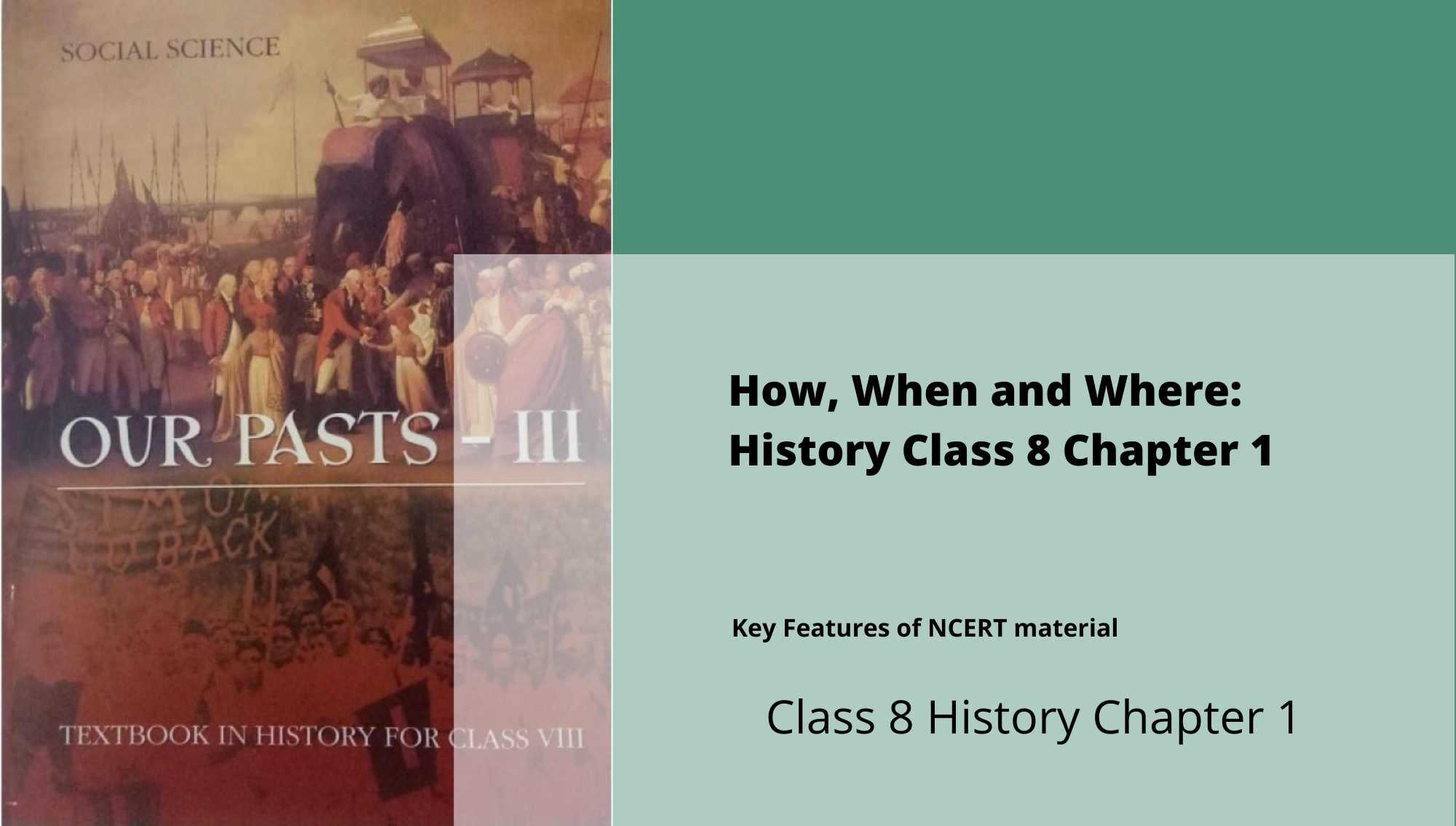How, When and Where: History Class 8 Chapter 1

Key Features of NCERT Material for Class 8 History Chapter 1 – How, When and Where
Quick revision notes
In Chapter 1 of Class 8 NCERT book: How, When, and Where , you are going to know about the ancestors, how, when and where they developed.
How Important are Dates?
Historians were fascinated with dates. History is about changes that occur over time, finding out how things were in the past and how things have changed. History was an account of battles and big events. It was about rulers and their policies. Historians wrote about the year a king was crowned, the year he married, the year he had a child, the year he fought a particular war, the year he died, and the year the next ruler succeeded to the throne. For events such as these, specific dates can be determined.
Which dates?
The dates we select and compose our story of the past are not important. They become vital because we focus on a particular set of events as significant. The chronology of different personalities’ lives marked the different chapters of the history of British India. It is to give each chapter some coherence. It is to tell a story in a way that makes some sense and can be followed.
How do we periodise?
In 1817, James Mill, drafted a massive three-volume work, A History of British India. In his book, he divided Indian history into three periods – Hindu, Muslim and British. Mill thought that all Asian societies were at a lower level of civilisation than Europe. According to his telling of history, before the British came to India, Hindu and Muslim despots ruled the country. Religious intolerance, caste taboos and superstitious practices dominated social life. According to him, British rule could civilise India. In this idea of history, British rule represented all the forces of progress and civilisation. Historians had divided Indian history into ‘ancient’, ‘medieval’ and ‘modern’.
In 1817, James Mill, a Scottish market analyst and political logician, distributed a monstrous three-volume work—A History of British India. In this, he isolated Indian history into three periods – Hindu, Muslim and British. This periodization came to be broadly acknowledged.
We attempt and gap history into various periods to catch the attributes of time and its focal highlights as they appear to us.
Moving endlessly from British arrangement, antiquarians have generally partitioned Indian history into ‘Antiquated’, ‘Archaic’ and ‘Present day’.
One significant wellspring of Indian history is the official record of the British organization. The Britishers accepted that the demonstration of composing was significant. Each guidance, plan, strategy, choice, understanding and examination must be obviously reviewed.
By the center of the nineteenth century, alongside the spread of printing, various duplicates of these records were printed as procedures of every administration office.
The act of looking over additionally got regular under the pioneer organization.
These records mention to us what the authorities thought, what they were keen on, and what they wished to save for children. These records consistently help us comprehend what others in the nation felt, and what lay behind their activities.
As printing spread, papers were distributed and issues were bantered openly. Pioneers and re¬formers wrote to spread their thoughts; writers and authors wrote to communicate their emotions.
History is about the progressions that happen after some time. It is about the discovering of how things were previously and how things have changed in the present. When we contrast the past and the current we allude to time, we talk of ‘previously’ and ‘after’.
In the event that somebody asks you when people started to drink tea or espresso, you would neglect to address this inquiry. It is on the grounds that people didn’t start drinking tea on a one fine day, they built up the preference for it after some time. In this manner, you can just allude to a range of time, an inexact period over which specific changes got obvious.
In any case, we have enough motivation behind why we partner history with a series of dates. Sometime in the past history was a record of fights and huge occasions. It was about rulers and their arrangements. Antiquarians expounded on the year when a lord was delegated, the year he wedded, the year he took on a specific conflict, and so on. For such occasions, explicit dates were fixed.
How would we discover that a specific arrangement of dates is significant? The dates we select, the dates around which we look at our account of the past, are not significant all alone. They became significant on the grounds that we center around a specific arrangement of occasions as significant.
The narratives composed by British students of history in India, the standard of every Governor-General was significant. These narratives started with the standard of the principal Governor-General Warren Hastings and finished with the last Viceroy Lord Mountbatten.
James Mill was a Scottish financial specialist and political savant. In 1817, he composed a three-volume book, A History of British India. In this he separated Indian history into three periods-Hindu, Muslim and British.
We isolate history into various periods so as to catch the attributes of a period, its focal highlights as they appear to us. So the terms through we periodise, for example delineate the contrasts between periods, gotten significant.
Plant was of the assessment that all Asian social orders were of the lower level of civilisations than Europe. As indicated by his recounting history, before the British came to India, Hindu and Muslim dictators controlled the nation. Strict narrow mindedness and station restrictions ruled the public activity of Indian people. English standard, as Mill suspected, could socialize India.
The British were completely preferential in arranging the Indian history. So the British characterization of the Indian history can’t be legitimized. It is on the grounds that an assortment of flaws existed at the same time alongside Hindus and Muslims in these periods.
The act of reviewing additionally got regular under the frontier organization.
By the mid nineteenth century nitty gritty studies were being done to plan the whole nation.
In towns, income overviews were directed.
From the finish of the nineteenth century, Census activities were held at the time period ten years. It arranged all the point by point records of the quantity of people in all the regions of India, noticing data on positions, religions and occupation.
All these are authentic records. These records don’t generally enable us to comprehend what others in the nation felt and what lay behind their activities.
To think about these things we have journals of people, records of explorers and voyagers, life accounts of significant characters, and so forth.
Every one of these sources were delivered by the individuals who were proficient. From these we won’t have the option to see how history was experienced and lived by the tribals, and the laborers, the laborers in the mines or the poor in the city.
Student of history: One who expounds on the occasions of the past, for example how things were and how they changed.
Discussion: Discussion on a significant subject of open intrigue.
Periodisation: Ponding any occasion into periods.
Old: Very old.
Archaic: It alludes to the period where highlights of modem society didn’t exist.
Colonization: Colonization is a cycle wherein one nation oppresses another and hence brings political, monetary, social and social changes.
Oppression: Gaining authority over a nation.
Calligrapher: One who is spent significant time in the specialty of excellent composition.
Review: The demonstration of analyzing and recording the estimations, highlights and so forth of a territory of land to set up a guide or plan for it.
Files: A spot where chronicled reports or records of an administration, an association, and so forth, are put away.
1773 – Warren Hastings turned into the primary Governor-General of India.
1782 – First guide created by James Rennel.
1817 – James Mill distributed a huge three-volume work, A History of British India.
1920 – The National Archives of India came up.

